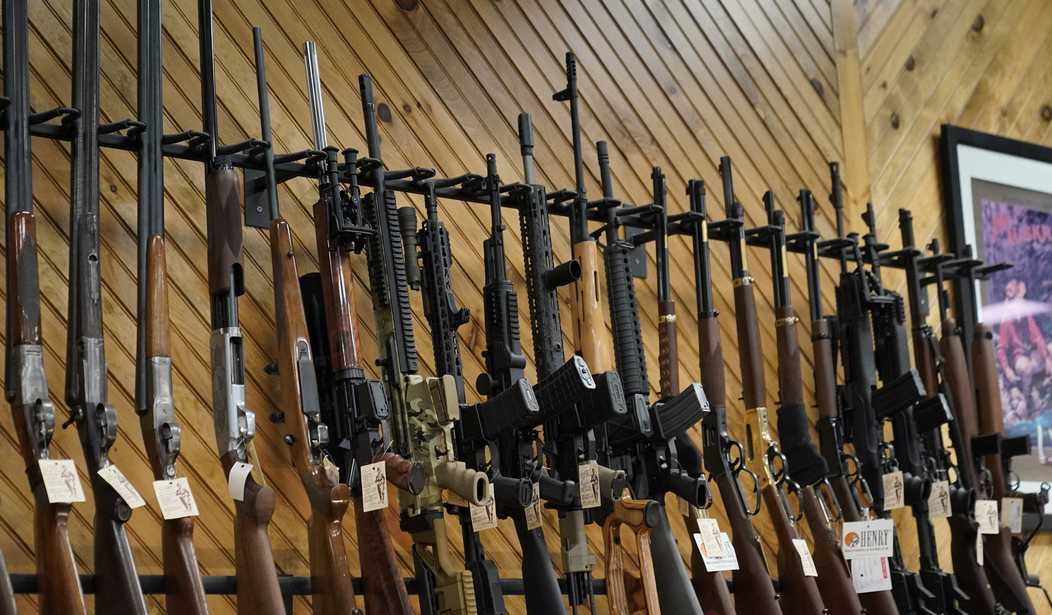Here’s another example of a policy that might sound good – and even do good – but could also have some potential pitfalls. The Justice Department on Monday announced a new rule that would allow federal firearms licensees (FFLs) to search the FBI database to see if a weapon they are interested in purchasing has been stolen.
The rule is intended to make it easier for gun sellers to avoid problems related to unknowingly buying a stolen firearm and to also help law enforcement investigate cases of gun theft.
The Justice Department, in a press release, announced that Attorney General Merrick Garland signed the rule that allows FFLs “to voluntarily access records of stolen firearms in the FBI’s National Crime Information Center (NCIC).”
This policy is aimed at implementing a part of the Bipartisan Safer Communities Act, passed in June 2022.
FFLs will immediately have two options to access the stolen gun records:
FFLs may partner with law enforcement agencies to search the NCIC stolen gun records.
States may request an extract of the NCIC stolen gun records to make available to FFLs within their jurisdiction.
A third option under development will allow FFLs that currently leverage the National Instant Criminal Background Check System for firearm background checks via E-Check to also use E-Check to query the NCIC stolen gun records.
When a search indicates a firearm is stolen, the FFL may report that information to a criminal justice agency. This will assist law enforcement agencies investigating reports of stolen firearms by providing potential investigative leads and will help deter or halt the sale of stolen firearms through seemingly legitimate business transactions.
There are some definite benefits to this rule. It could help FFLs avoid problems that could arise if they inadvertently purchase a stolen gun for their inventory and reduce the likelihood of legal complications that could arise as a result.
I asked people’s opinions on the policy on X and one of my brilliant followers, a former FFL, thought it was a good idea. “If I were to buy a stolen gun I’m out that money … So seems fair to let me see what guns are shown to be stolen,” she wrote.
As a former FFL holder I don't see an issue. If I were to buy a stolen gun I'm out that money> So seems fair to let me see what guns are shown to be stolen.
— 𝙇𝙚𝙞𝙜𝙝 𝙄 𝘼𝙢 (@factualone) June 26, 2024
Another benefit is that if an FFL reports that someone is trying to sell a stolen firearm, it could make it easier for law enforcement to track down the culprit. Given that many guns used in crimes are stolen, this could help to save lives in the future by finding the weapon and its thief before they can victimize someone with it. It could reap positive results for public safety. It could also help the legal owner of the firearm get their property back.
However, there are some potential problems with the rule, despite its benefits. Privacy and data security could be an issue here. The press release does not indicate what kind of information the FFL will see when they look up a firearm. If it only indicates whether a firearm has been stolen, while providing no other information, then privacy could be protected in this instance. But if it gives more information than is necessary, then the government could be allowing FFLs to violate privacy rights.
Another issue is how such a policy could lead to something more dangerous. Firearms instructor Kerry Slone, founder of We the Female, told RedState, “On the surface, this has zero impact on lawful gun owners. But with anything coming from the Federal government, ask yourself two questions: 1. What is the underlying intent? 2. How could this be expanded upon in the future?”
She also questioned whether it will actually help to reduce gun trafficking. “When was the last time organized criminals tried to traffic firearms through the government?” she asked.
What if, however, this was step one in the transition of government operated FFls, which will receive FULL ACCESS to all 4473 information, via the de facto “ownership database” that BATF Director Steven Dettelbach let slip out as existing during testimony.
Moreover, there could be the risk of innocent people getting railroaded by law enforcement. What if I decided to sell a firearm that I bought from someone who had stolen it, not knowing how they obtained the gun? Corrupt authorities could decide it’s easier to target me rather than going after the actual thief.
If one trusts the government, then this new rule is a slam dunk. Not only would it help FFLs avoid legal problems, it could help law enforcement catch those who steal firearms. However, as with any policy, there is room for it to be abused.














